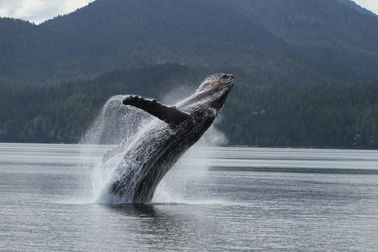
OUR PROJECTS
At SOL, most of our projects are focused upon whales and seabirds in coastal British Columbia (BC), Canada, but we want to be a home for students interested in *anything* about the ocean *anywhere* in the world!
Our work in BC is focused upon assisting Coastal First Nations in monitoring the marine mammals and seabirds using their traditional waters, as well as assessing the impacts of coastal industries -- especially shipping and fisheries.
During the fall and spring semesters, we work in the lab on data-driven projects, such as updating photo-identification catalogs of whales, categorizing whale vocalizations, quantifying whale body condition and entanglement scarring rates, analyzing seabird surveys, conducting literature reviews and preparing manuscripts.
We also support students in their search for summer field internships. SOL students have worked at Fin Island Research Station with BC Whales, and at Orcalab with the Pacific Orca Society. We also support students wishing to build upon previous fieldwork experiences such as Sewanee's Island Ecology Program, Sewanee's New Zealand field course, study abroad programs with SIT.
Our focus at Sewanee Ocean Lab is both research and environmental education. We want more people to understand the way the ocean works, all the reasons it is so important, all the ways it is threatened, and all the pathways by which our lifestyles in land-locked Tennessee impact marine ecosystems worldwide.
INTERESTED IN MARINE RESEARCH or EDUCATION?
(1) Start early, cast your net wide & keep an eye on what's out there
Undergraduate research is a wonderful time for exploration and career discernment. I encourage you to pursue as many different experiences as you can, in several different disciplines, before you start thinking about what happens after you graduate. If you make the most of every single opportunity, the skills you learn and the professional network you grow will set you up for whatever comes next.
This is particularly true for marine science -- after all, the ocean is a BIG place full of diverse ecosystems. Fish! Plankton! Currents! Ocean chemistry! Ocean-climate interactions! Coastal systems! Beach dynamics! Islands! Reefs! Kelp forests! Fisheries! Aquaculture! Big predators!
One of the best ways to get a sense of what is out there -- what the internships options are, what the job market is looking like, and who is doing the most exciting work, etc. -- is start monitoring email listserv's from specific research disciplines. Here is a doc where I keep a running list of the listservs I am aware of.
And while it may sound counterintuitive at first, I enthusiastically recommend getting involved in wildlife surveys being conducted by Sewanee's Office of Domain Management, as the sampling approaches they use are also used in marine fieldwork.
If a career in education is even a remote possibility for you, I highly recommend joining the listserv's at the North American Association for Environmental Education.
(2) Take as many ocean-related courses as you can!
At Sewanee I teach in several courses that introduce students to marine ecosystems and marine conservation:
-
Ecosystems of the Ocean (ENST 209)
-
Marine Policy & Conservation (ENST 338)
-
Island Ecology Program (ESCI 240)
-
New Zealand field course in Sustainability & Global Change (ENST 211+212)
-
We also cover many large marine species in "Fantastic Beasts! The culture & conservation of monstrous megafauna" (ENST 222)
(3) Education or Research? (Or Both?!) Either way, demonstrate commitment.
If you are serious about graduate-level work in marine science (or any ecological science), take as many courses as you can in R, GIS and statistics. Be on the lookout for my course, "Data storytelling & sustainable development" (ESCI 222).
If you are serious about becoming an environmental educator, start pursuing opportunities and courses that support that career path. I recommend looking into our local collaborators the Cumberland Forest School and the Friends of South Cumberland State Park. Also, be on the lookout for my course, Equitable Environmental Education (ENST 254).
(4) If you get this far, please reach out!
I am very happy to chat at any point about the ocean -- or careers, or the mysteries of life, or whatever -- with anyone who shares my interests in it. If you want to take the next step of working on the research ongoing at Sewanee Ocean Lab, you should first demonstrate progress on the three items above.












